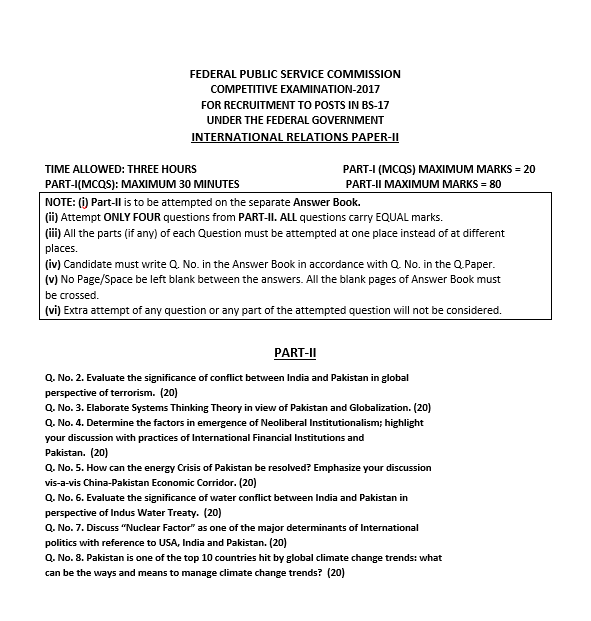CSS International Relations 2017 paper(b)
No. 2. Evaluate the significance of conflict between India and Pakistan in the global perspective of terrorism. (20)
No. 3. Elaborate Systems Thinking Theory in view of Pakistan and Globalization. (20)
No. 4. Determine the factors in the emergence of Neoliberal Institutionalism; highlight your discussion with practices of International Financial Institutions and Pakistan. (20)
No. 5. How can the energy Crisis of Pakistan be resolved? Emphasize your discussion vis-a-vis the China-Pakistan Economic Corridor. (20)
No. 6. Evaluate the significance of the water conflict between India and Pakistan in the perspective of the Indus Water Treaty. (20)
No. 7. Discuss the “Nuclear Factor” as one of the major determinants of International politics with reference to the USA, India, and Pakistan. (20)
No. 8. Pakistan is one of the top 10 countries hit by global climate change trends: what can be the ways and means to manage climate change trends? (20)
Summary of Questions:
No. 2. Evaluate the significance of conflict between India and Pakistan in the global perspective of terrorism.
The conflict between India and Pakistan significantly contributes to global terrorism, particularly due to their ongoing disputes over Kashmir and their nuclear rivalry. The tension has fueled militant groups and insurgencies, impacting regional and international security. The global community is concerned about the escalation of violence and its potential to lead to broader conflicts or the spread of terrorism.
No. 3. Elaborate Systems Thinking Theory in view of Pakistan and Globalization.
Systems Thinking Theory focuses on understanding the complex interrelationships within a system, considering the whole rather than individual components. In the context of Pakistan and globalization, this theory helps analyze the interconnectedness of economic, political, and social factors affecting Pakistan’s development. Globalization impacts Pakistan’s economy, politics, and culture, and Systems Thinking can offer insights into how these elements influence each other in a global context.
No. 4. Determine the factors in the emergence of Neoliberal Institutionalism; highlight your discussion with practices of International Financial Institutions and Pakistan.
Neoliberal Institutionalism emerged as a theory advocating cooperation through international institutions, focusing on reducing conflict and promoting economic interdependence. Key factors include the growth of global trade and the role of international financial institutions like the IMF and World Bank in shaping policies. For Pakistan, these institutions influence economic reform, development policies, and structural adjustments, although they can also create challenges in terms of debt and sovereignty.
No. 5. How can the energy crisis of Pakistan be resolved? Emphasize your discussion vis-a-vis the China-Pakistan Economic Corridor.
Pakistan’s energy crisis can be addressed through investment in renewable energy, infrastructure development, and reducing energy wastage. The China-Pakistan Economic Corridor (CPEC) plays a crucial role by facilitating energy projects like power plants and renewable sources. These projects can help improve Pakistan’s energy security, reduce dependence on imports, and enhance economic growth through better energy supply.
No. 6. Evaluate the significance of the water conflict between India and Pakistan in the perspective of the Indus Water Treaty.
The water conflict between India and Pakistan, especially over the Indus River system, remains a critical issue. The Indus Water Treaty, signed in 1960, governs the distribution of water between the two nations. Tensions arise over the construction of dams and water usage, which affect Pakistan’s agricultural sector. The significance lies in the potential for conflict, but the treaty has also played a role in mitigating large-scale disputes.
No. 7. Discuss the “Nuclear Factor” as one of the major determinants of International politics with reference to the USA, India, and Pakistan.
The “Nuclear Factor” plays a crucial role in shaping international politics, particularly in the case of the USA, India, and Pakistan. The nuclear capabilities of these nations influence their foreign policies, defense strategies, and global power dynamics. India and Pakistan’s nuclear rivalry affects regional stability, while the USA’s policies often aim to manage and mitigate nuclear tensions in South Asia to prevent escalation.
No. 8. Pakistan is one of the top 10 countries hit by global climate change trends: what can be the ways and means to manage climate change trends?
Pakistan faces significant challenges due to climate change, such as extreme weather events, flooding, and water scarcity. To manage these trends, Pakistan can focus on implementing sustainable practices, strengthening disaster preparedness, promoting renewable energy, and improving water management. Global collaboration, along with local adaptation strategies, is essential to mitigate the impacts of climate change in the country.
